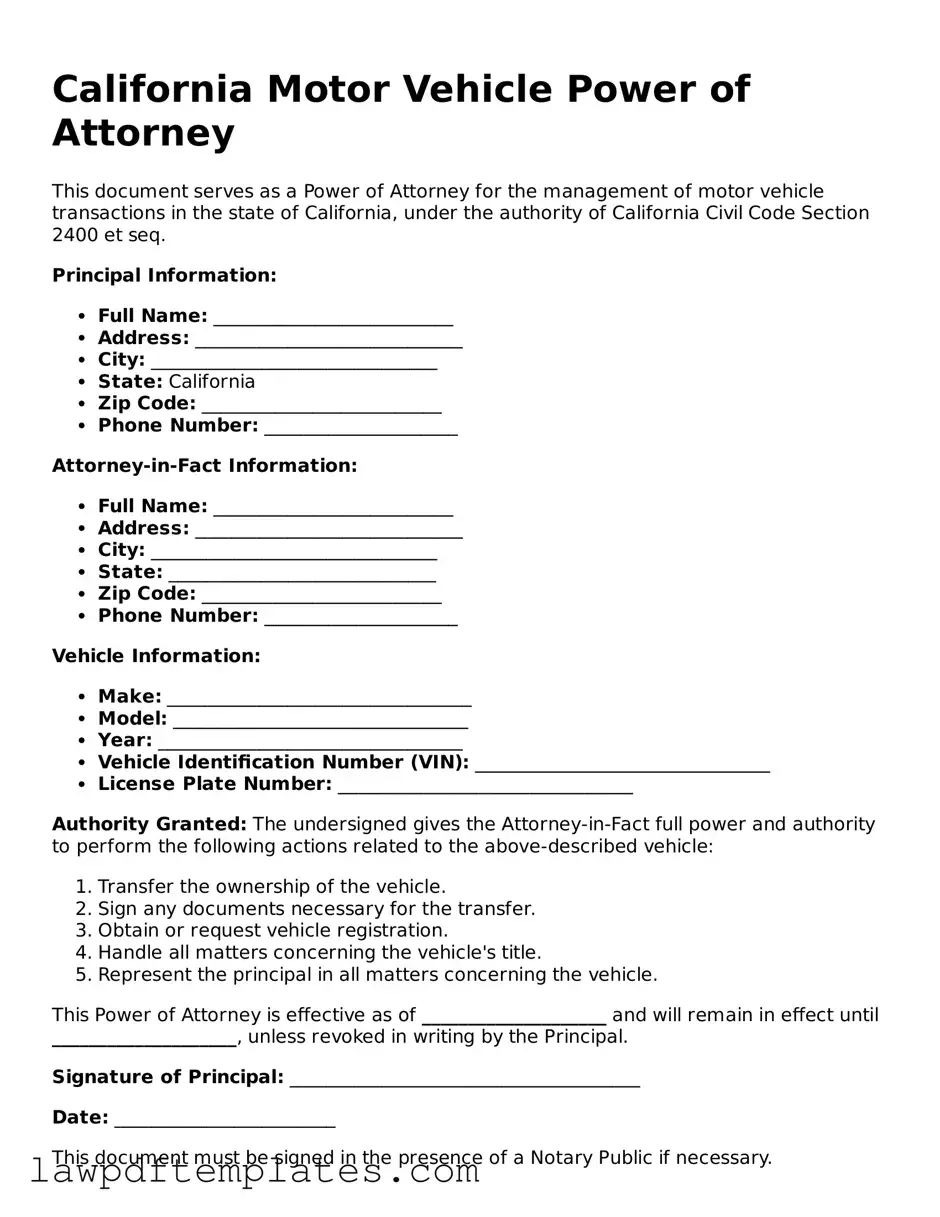Free Motor Vehicle Power of Attorney Template for the State of California
Form Breakdown
| Fact Name | Details |
|---|---|
| Purpose | The California Motor Vehicle Power of Attorney form allows an individual to authorize another person to act on their behalf regarding vehicle-related matters. |
| Governing Law | This form is governed by the California Civil Code Section 2400-2403. |
| Eligibility | Any adult resident of California can create a Power of Attorney for motor vehicle transactions. |
| Agent Responsibilities | The appointed agent can handle tasks such as transferring vehicle titles, registering vehicles, and obtaining license plates. |
| Signature Requirement | The form must be signed by the principal (the person granting authority) in front of a notary public or two witnesses. |
| Revocation | The principal can revoke the Power of Attorney at any time, as long as they provide written notice to the agent. |
| Expiration | The Power of Attorney does not have an automatic expiration date unless specified by the principal. |
| Use Cases | This form is particularly useful for individuals who are unable to attend DMV appointments or complete transactions in person. |
| Form Availability | The California Motor Vehicle Power of Attorney form can be obtained online through the California DMV website or at local DMV offices. |
| Legal Advice | While this form is straightforward, consulting with a legal professional is advisable to ensure it meets individual needs and circumstances. |
Sample - California Motor Vehicle Power of Attorney Form
California Motor Vehicle Power of Attorney
This document serves as a Power of Attorney for the management of motor vehicle transactions in the state of California, under the authority of California Civil Code Section 2400 et seq.
Principal Information:
- Full Name: __________________________
- Address: _____________________________
- City: _______________________________
- State: California
- Zip Code: __________________________
- Phone Number: _____________________
Attorney-in-Fact Information:
- Full Name: __________________________
- Address: _____________________________
- City: _______________________________
- State: _____________________________
- Zip Code: __________________________
- Phone Number: _____________________
Vehicle Information:
- Make: _________________________________
- Model: ________________________________
- Year: _________________________________
- Vehicle Identification Number (VIN): ________________________________
- License Plate Number: ________________________________
Authority Granted: The undersigned gives the Attorney-in-Fact full power and authority to perform the following actions related to the above-described vehicle:
- Transfer the ownership of the vehicle.
- Sign any documents necessary for the transfer.
- Obtain or request vehicle registration.
- Handle all matters concerning the vehicle's title.
- Represent the principal in all matters concerning the vehicle.
This Power of Attorney is effective as of ____________________ and will remain in effect until ____________________, unless revoked in writing by the Principal.
Signature of Principal: ______________________________________
Date: ________________________
This document must be signed in the presence of a Notary Public if necessary.
Common mistakes
Filling out the California Motor Vehicle Power of Attorney form can be straightforward, but many people make common mistakes that can lead to delays or complications. One frequent error is not providing all required information. Each section of the form must be completed accurately. Missing details, such as the vehicle identification number (VIN) or the names of the parties involved, can render the form invalid.
Another mistake is failing to sign the form correctly. The person granting power of attorney must sign in the designated area. If this step is overlooked or if the signature does not match the name printed on the form, it could cause issues. Remember, a signature is not just a formality; it verifies the intent and agreement of the parties.
People also often overlook the need for a witness or notary. Depending on the circumstances, having the form notarized can be crucial. Some individuals assume that a signature is sufficient, but without proper witnessing or notarization, the document may not be accepted by the Department of Motor Vehicles (DMV).
Another common error is using outdated forms. Laws and requirements can change, so it’s essential to ensure that you are using the most current version of the form. Using an old version might lead to unnecessary complications or rejections when submitting the document.
Lastly, individuals sometimes fail to understand the implications of granting power of attorney. It’s important to be clear about what powers are being given. Misunderstanding the extent of authority can lead to unintended consequences. Make sure to review and comprehend all sections of the form before signing.
Discover More Motor Vehicle Power of Attorney Templates for Specific States
Limited Power of Attorney Georgia - For those without legal experience, this power of attorney provides a clear structure for delegating vehicle responsibilities.
To assist landlords and tenants in Georgia, it is vital to understand the requirements of a comprehensive Residential Lease Agreement form, which ensures that both parties are well-informed of their rights and responsibilities under the rental arrangement. For more details, visit the Residential Lease Agreement form resource.
Limited Power of Attorney for Motor Vehicle - The document must be signed, often in front of a notary, to be valid.
How to Get Power of Attorney to Sell a Car - Affords a legal means to delegate responsibility for vehicle-related tasks.
Illinois Dmv Power of Attorney - Power of Attorney can be crucial for out-of-state vehicle dealings.
